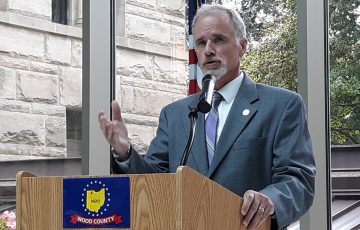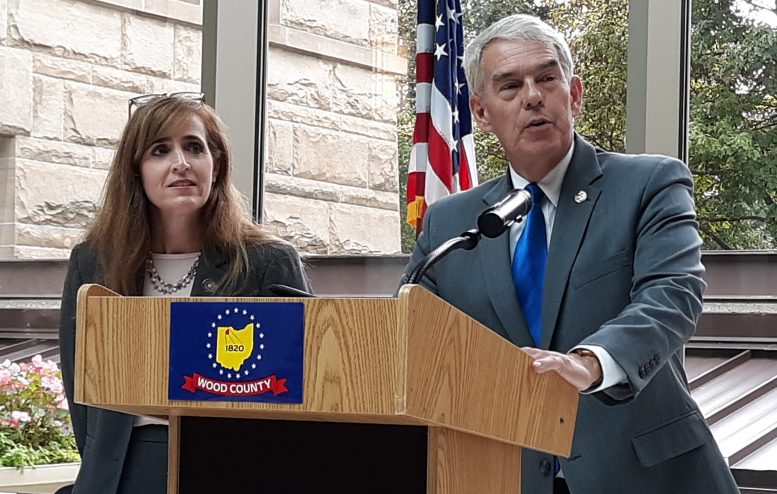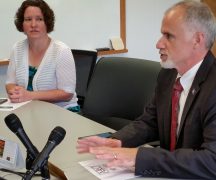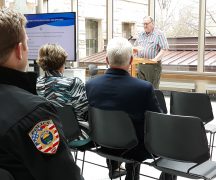By JAN LARSON McLAUGHLIN
BG Independent News
Drug offenders in Ohio currently encounter the carrot and the stick. If they participate in treatment and comply with the courts’ orders, they can often avoid jail time.
State Issue 1 would only offer the carrot – and take away the stick.
That just won’t work, according to local judges, the county prosecutor, sheriffs and state legislators.
On Thursday, some of that local opposition to Issue 1 gathered in the Wood County Courthouse atrium.
On the surface, Issue 1 may look harmless. It downgrades the vast majority of drug offenses from felonies to misdemeanors. And it promises to move money saved by not incarcerating drug offenders into drug treatment programs.
Proponents of the issue, which will appear on the Nov. 6 ballot, are massively outspending opposition, according to State Senator Randy Gardner, R-Bowling Green. As of a month ago, Issue 1 had raised $4.1 million, with much of that being money from outside Ohio, he said. Meanwhile, there was no organized opposition to the issue.
Issue 1 – which would change the state constitution – was not getting much attention until recently, Gardner said.
So Gardner and State Rep. Theresa Gavarone, R-Bowling Green, asked local law enforcement and court officials to join them Thursday to express their concerns.
“Our courts are on the front lines for this,” Gavarone said.
As officials took their turn at the podium, they were unanimous in their opposition to Issue 1.

Wood County Prosecuting Attorney Paul Dobson voices opposition to Issue 1.
Wood County Prosecuting Attorney Paul Dobson talked about the newly created ARC program, which is currently working with 70 opiate addicts in the county. The program is having such success because it is able to offer addicts intervention in lieu of jail time. If jail time was not an option, it is unlikely that many of those addicts would go through the difficult treatment process.
“Almost all of those efforts will be negated by State Issue 1,” Dobson said.
Issue 1 would remove drug offenses from the criminal justice process, to be treated solely by the behavioral health process. It’s a mistake to not include both processes for drug addicts, he said.
Dobson has heard from many addicts who seek treatment only because a judge has told them it’s either treatment or jail.
Gardner said he has heard the same stories from addicts who don’t seek treatment until they hit rock bottom – which is the threat of jail time.
“Jail saved my life,” Gardner said one man in his district recently told him.
Whether intentional or not, Issue 1 would also create an open door for drug dealers in Ohio, Dobson said.
“It encourages drug traffickers to focus on our citizens,” he said.
Though the opposition was slow to realize the impact of Issue 1, it is now speaking loudly with a united voice.
Wood County Common Pleas Judge Alan Mayberry said he has never seen a statewide issue that has united the Ohio Chief Justice, sheriff’s association, county prosecutors and common pleas judges in outspoken opposition.
“This needs to be defeated,” Mayberry said.
Under Issue 1, someone could be picked up with 19 grams or less of fentanyl – enough to kill 10,000 people – and could only be charged with a misdemeanor and be put on probation, the judge said.
“That’s unconscionable,” Mayberry said.
Wood County Sheriff Mark Wasylyshyn and Lucas County Sheriff John Tharp also voiced their strong opposition to the statewide issue.
“People are dying day in and day out,” from opiate overdoses, Tharp said. As law enforcement, it is his job to protect the weak – those not strong enough to quit drugs on their own, he said. And that requires both the carrot and the stick.
“We all know you have to have the stick to get people to cooperate,” Tharp said.
Wasylyshyn said the issue also sends the wrong message to Ohioans.
“We’re telling our society it must not be bad or serious,” when drug offenses are no longer felonies. But the opiate crisis is very serious, he said. “We have people who are dying everyday.”
Wasylyshyn also questioned the appropriateness of putting this language in the state constitution. Unlike legislation that can be tweaked to fix problems, it is very difficult to make changes to language once it’s in the constitution.
“It is wrong for us to mess with the state constitution,” the sheriff said.





